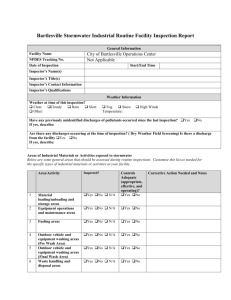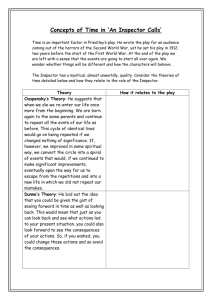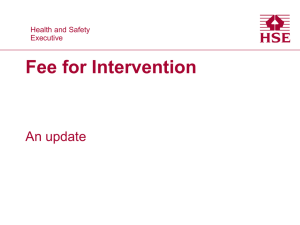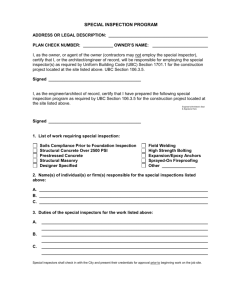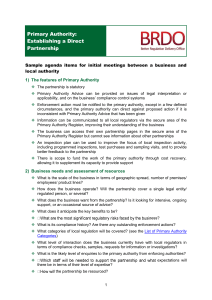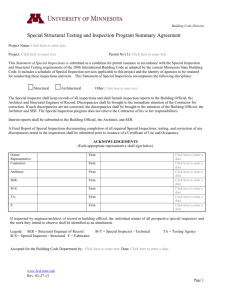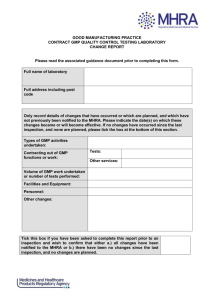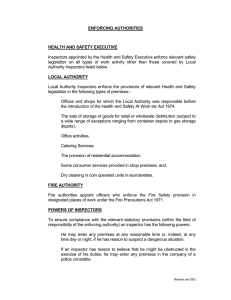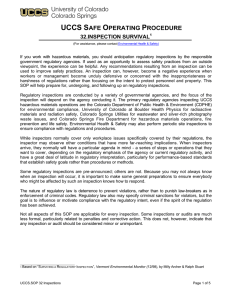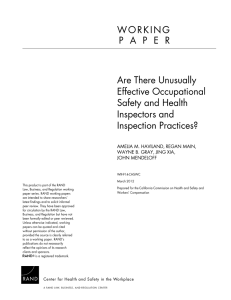Dealing with external regulatory bodies
advertisement
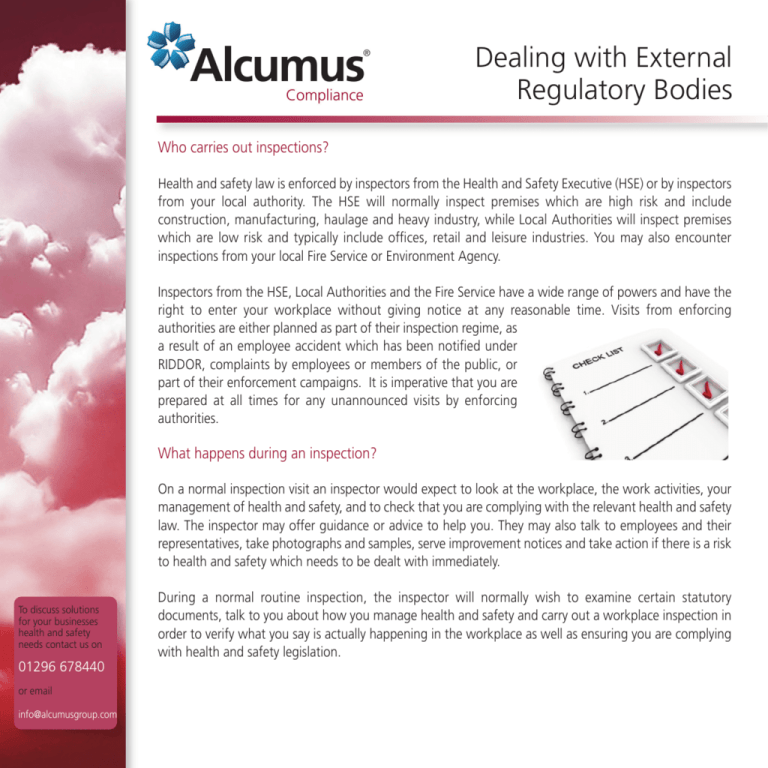
Dealing with External Regulatory Bodies Who carries out inspections? Health and safety law is enforced by inspectors from the Health and Safety Executive (HSE) or by inspectors from your local authority. The HSE will normally inspect premises which are high risk and include construction, manufacturing, haulage and heavy industry, while Local Authorities will inspect premises which are low risk and typically include offices, retail and leisure industries. You may also encounter inspections from your local Fire Service or Environment Agency. Inspectors from the HSE, Local Authorities and the Fire Service have a wide range of powers and have the right to enter your workplace without giving notice at any reasonable time. Visits from enforcing authorities are either planned as part of their inspection regime, as a result of an employee accident which has been notified under RIDDOR, complaints by employees or members of the public, or part of their enforcement campaigns. It is imperative that you are prepared at all times for any unannounced visits by enforcing authorities. What happens during an inspection? On a normal inspection visit an inspector would expect to look at the workplace, the work activities, your management of health and safety, and to check that you are complying with the relevant health and safety law. The inspector may offer guidance or advice to help you. They may also talk to employees and their representatives, take photographs and samples, serve improvement notices and take action if there is a risk to health and safety which needs to be dealt with immediately. To discuss solutions for your businesses health and safety needs contact us on 01296 678440 or email info@alcumusgroup.com During a normal routine inspection, the inspector will normally wish to examine certain statutory documents, talk to you about how you manage health and safety and carry out a workplace inspection in order to verify what you say is actually happening in the workplace as well as ensuring you are complying with health and safety legislation. Prior to the inspection or visit taking place, the inspector will have identified key areas which are relevant to your business and are based on risk. This will normally include high risk activities, such as: ■ ■ ■ ■ ■ ■ Work at height, including ladder safety Transport safety Manual handling Slips and trips Machinery safety and guarding Risk from asbestos In addition to the above topic areas and any other specific areas relative to your business the inspector will also concentrate on how you manage the risk within the business including: ■ ■ ■ ■ ■ ■ ■ Access to competent advice Health and safety responsibilities, duties, policy, procedures and guidance Consultation and communication with employees on health and safety Training records and information provided to employees Risk assessments and safe systems of work How you maintain premises, plant and equipment including service records Safe place of work, environment and provision of adequate welfare facilities In addition to routine inspection, enforcing authorities may undertake planned campaigns which target specific industries and focus on certain topic areas, these may include: ■ ■ ■ To discuss solutions for your businesses health and safety needs contact us on 01296 678440 or email info@alcumusgroup.com ■ ■ ■ ■ ■ Asbestos “The Hidden Killer” a duty manage risk from exposure to asbestos Falls from vehicles Falls from height and ladder sfety Hand arm vibration Slips and trips Manual handling Worker involvement/safe and sound advice Gas safety and maintenance of gas appliances What can you do to ensure compliance? Due to the varying nature of the enforcing authorities work including planned inspections, campaigns and accident investigations it is necessary to be prepared and more importantly to project an image of confidence to the inspector. This will also help in reducing any potential cost as a result of enforcement action being taken should the inspector identify any material breach of health and safety law. Since the introduction of “Fees for Intervention” by the HSE, if an inspector from the HSE identifies any material breach and has cause to write to you then they will charge you for the privilege at a cost of £124 per hour. This includes any time spent identifying the breach as well as any administration time. Therefore we would recommend that all the necessary documentation which may be required is held in one place and senior managers are aware on how to access this information. We would recommend that you set up your systems based on compliance folders which include: ■ ■ ■ ■ ■ ■ ■ ■ ■ ■ Statutory Documents (Thorough Examination and Lifting Certificates, Driving Licenses) Health and Safety Policy including duties and responsibilities (ensure it is up to date) Service Records (Gas, Electric, Fire Alarms, Pressure Systems, Fork Lift Trucks) Inspection and maintenance records both internal and external. Staff Training Records, Fire Marshals, First Aid, Health and Safety Courses Risk Assessments (including manual handling, DSE and COSHH assessments, fire risk assessment) Safe Systems of Work and Method Statements Safety Checklist / Tours / Workplace inspections Health and Safety Minutes from Meetings Arrangements for communicating health and safety to employees What can we do to help? To discuss solutions for your businesses health and safety needs contact us on We offer a variety of services that can help companies meet their health and safety obligations, whatever their size, by providing a range of health and safety packages or one off services to meet specific needs as well as consultancy services and health and safety law advice. 01296 678440 or email info@alcumusgroup.com Midshires House, Midshires Business Centre, Smeaton Close, Aylesbury, Bucks, HP19 8HL T: 01296 678440 E: info@alcumusgroup.com www.alcumusgroup.com
